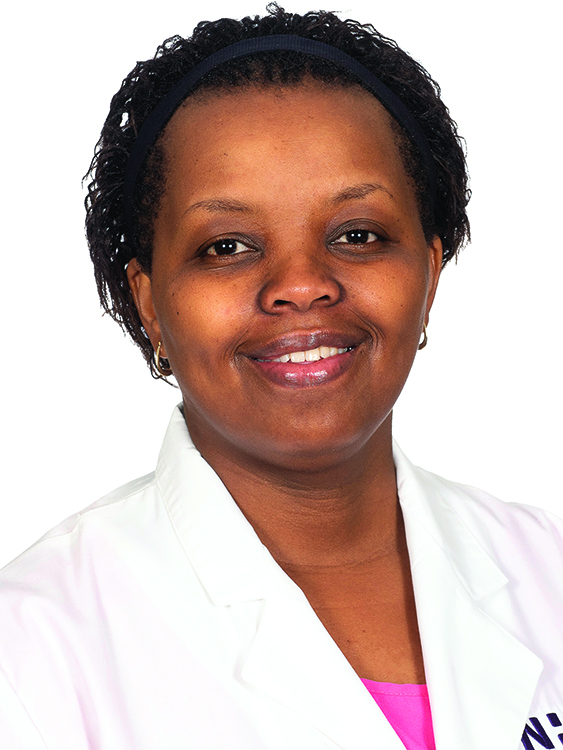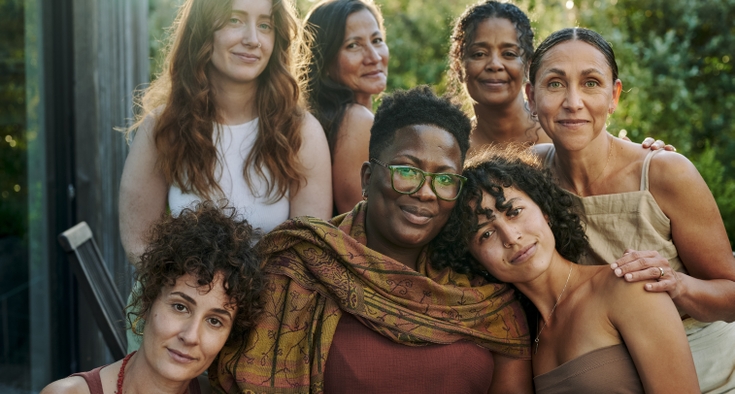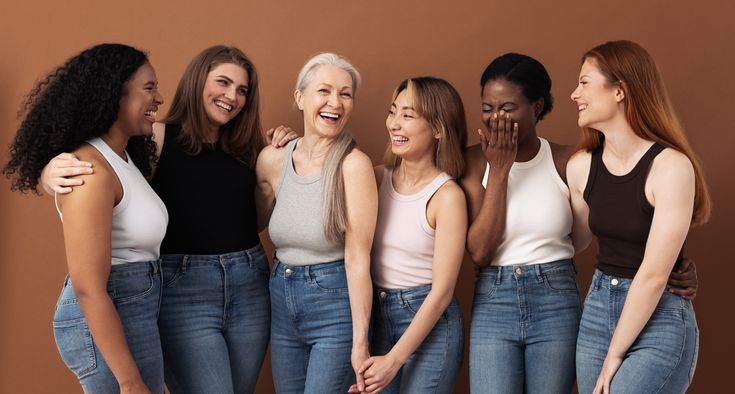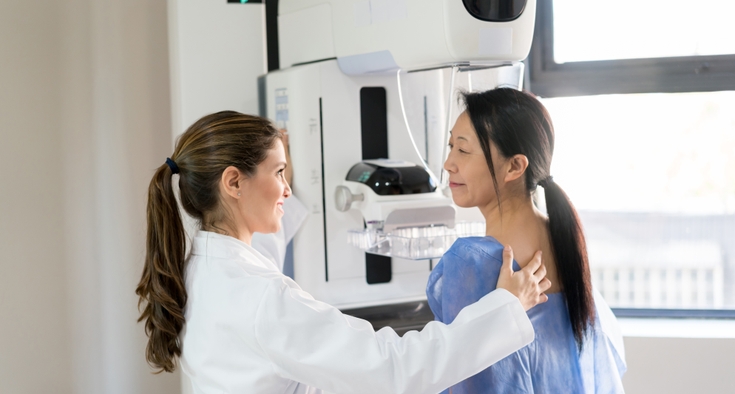When a person is diagnosed with breast cancer, the questions come flooding in. Why did this happen to me? Did I do something to cause my cancer?

Patients sometimes bring these struggles to Dr. Sandrine Crane, a hematologist and oncologist at Novant Health Cancer Institute - Kernersville, who primarily treats patients with breast cancer.
“By the time I see patients, they have known about the diagnosis for some time and have had a lot of time to think about their situation,” she said. “They want to know if they did something to contribute to it.”
She reminds patients that cancer is a complex disease. Many factors can contribute to its occurrence, including plenty that people cannot control, such as their genetic makeup, family history, having dense breast tissue, beginning menstruation early, or even being old, she said. Researchers are still trying to understand other factors. In many cases, there is no obvious reason why someone gets breast cancer.
Here, Crane discusses frequently asked questions about the causes of breast cancer and suggests ways people may be able to reduce their risk.
Breast cancer care to support your every need.
Did I do something to cause my breast cancer?
Genetics or a family history of cancer plays a role in only 5% to 10% of breast cancer cases, according to the American Cancer Society. The large majority of cases have no obvious cause. Cancer is often the result of several factors coming together, perhaps over decades, that result in genetic changes that are then reproduced in the body.
The causes can even include random genetic errors that occur as the cells in our body divide and replicate. Not knowing the reasons can be unsettling, but questioning past behaviors or potential causes may not be helpful to many of us.
We recommend focusing on what we can control. And at that moment, it is following up with the recommended treatment, whether it is surgery, radiation therapy, chemotherapy, endocrine therapy and any follow-through. Going forward, we will definitely discuss what lifestyle modifications may be appropriate to improve their health and reduce their overall risks for other health concerns now and in the future.
Will less alcohol reduce my breast cancer risk?
Certain lifestyle choices are linked to increased risk for breast cancer, including the use of alcohol. Breast cancer is the most common alcohol-associated cancer among women. Research has shown alcohol consumption can increase hormone levels, including estrogen, which can play a role in breast cancer development. U.S. dietary guidelines recommend women abstain from alcohol or consume 1 or fewer servings of alcohol per day.
There’s not much research that shows what happens to women’s cancer risk if they decrease or eliminate alcohol after previous use. But reducing or stopping alcohol use is a positive change, especially because consumption can increase the risk of being overweight or obese, which is a risk factor for breast cancer and other health conditions.
Can quitting smoking prevent me from getting cancer?
Best doctors. Amazing nurses. Remarkable care.
Women who have smoked for many years have an increased risk of breast cancer, and the risk increases the more someone smokes, and the longer they do it. There is a bit of good news here – even if you have smoked in the past, stopping can immediately improve your health and sustained quitting can reduce your cancer risk. Although studies have not focused specifically on breast cancer, research shows quitting for more than 20 years can significantly cut your chances of cancers including larynx, pharynx and pancreatic cancer, dropping your risk close to the risk of someone who has never smoked. More research is needed specifically on how quitting smoking can improve the breast cancer risk.
Can using oral contraceptives or menopausal hormone replacement therapy cause breast cancer?
Both oral contraceptives and hormone replacement therapy involve using synthetic versions of hormones including estrogen and progesterone. Just like with any treatment, there are benefits and risks involved, and you would want to discuss the benefits and risks with your doctor or other provider.
Studies have shown people who use oral contraceptives that combine estrogen and progesterone are at higher risk of developing breast cancer compared to those who have never used a combination birth control pill. The risk depends on the type of combination pill and the length the person was taking it.
After menopause, the ovaries stop making estrogen and progesterone and the absence of the hormones can cause hot flashes, night sweats and increased the risk for bone loss, heart disease, cancer and other issues.
Menopausal hormone replacement therapy (HRT) can ease some of the worst symptoms of menopause, but like any treatment, the benefits of using these therapies are accompanied by risks, including a slightly increased risk of breast cancer, depending on what type of therapy is used. A study that linked HRT to heart disease was proven to be deeply flawed and today many doctors recommend the treatment.
Patients should have a risk-benefit conversation with their doctor. If it has to be used to treat another medical condition, we usually recommend the least amount that is needed and recommend it be used for the shortest amount of time possible.
What are common myths about the causes of breast cancer?
Many questions from patients require a nuanced answer. But there are some questions that come up that can be addressed more easily, such as whether sugar can contribute to or worsen cancer. That is definitely a myth. Everything we consume, whether it is fat, protein or carbohydrates gets broken down into small units of energy. They are all equivalent – they all provide energy to the body. But they do not contribute to cancer.
Another question that comes up is whether an underarm antiperspirant or deodorant has some connection with breast cancer. There is no scientific evidence that products applied under the arm, or skincare products containing aluminum, have any impact on breast cancer risk.
Some people wonder why they are told to skip using deodorant or antiperspirant the day of a mammogram. This request is not because the products are harmful to the patient or breast health. It is because specks of aluminum in these products can show up on a mammogram as small white spots. These specks could be confused with tiny calcifications that may occur in the breast and signal breast cancer. So, it is best to keep your skin clear of any products on mammogram day so doctors can read your breast images clearly and effectively.
What is the best thing I can do to prevent breast cancer?
Unfortunately, there is no foolproof way to prevent cancer. There are many contributing factors, and a person can eat healthfully, exercise, avoid substances like tobacco and alcohol, and still get cancer. Scientists and doctors are committed to learning everything they can to keep people the healthiest they can be, and hopefully never face a cancer diagnosis.
One thing that is extremely important for all people in reducing disease and specifically cancer risk is to stay active. Regular exercise, which can help people get to and maintain a healthy weight, cuts the risk of an extensive list of diseases. This includes 13 types of cancer, including breast cancer. Regular exercise also helps improve outcomes for people who have already been diagnosed with cancer. You want to aim for about 150 minutes of moderately intense exercise a week, or 75 minutes each week of really vigorous activity.













